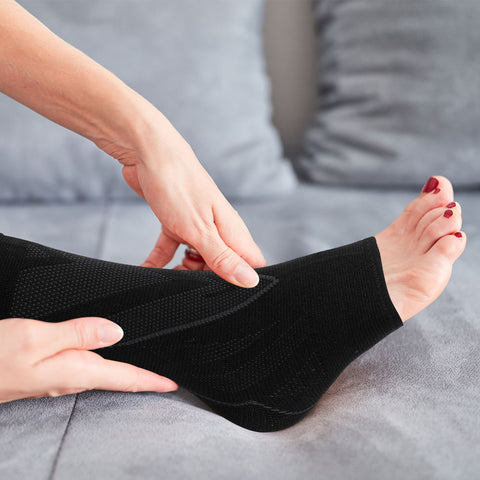What Is the Cause of Swollen Ankles

Swollen ankles, also known as ankle edema, are the result of an abnormal accumulation of fluid in the tissues surrounding the ankle. It's a typical symptom that might arise for several reasons. Ankle edema can be unpleasant and could be a sign of a health issue or lifestyle choice. It is essential to understand the causes of swollen ankles to administer and treat them effectively.
Medical Conditions
Heart Disease
Heart disease can cause swollen ankles by impairing the heart's ability to pump blood efficiently, leading to fluid retention in the lower limbs.
Breathlessness, exhaustion, and sudden weight gain are some signs of heart-related ankle swelling.
Kidney Disease
A fluid and electrolyte imbalance caused by impaired kidney function can lead to edema in the ankles and other parts of the body.
High blood pressure, fatigue, and changes in urine patterns are some indicators of kidney-related ankle swelling.
Liver Disease
Ankle swelling can arise from liver diseases like cirrhosis, which can lead to an accumulation of fluid in the abdomen that can spread to the lower limbs.
It is possible to identify liver-related ankle edema by looking for signs of jaundice, nausea, and stomach pain.
Pregnancy
Pregnancy-related ankle swelling is often experienced due to the body's increased fluid retention and increased pressure on the veins.
Those who are expecting should keep an eye out for any abrupt or significant changes in ankle swelling and, if necessary, seek medical advice.
People who are aware of how these illnesses can cause swollen ankles may be able to identify any underlying issues and seek the necessary medical care for diagnosis and treatment.
Lifestyle and Environmental Factors
- Extended Standing or Sitting: Prolonged standing or sitting can impair the legs' ability to receive blood, potentially leading to fluid retention and ankle swelling. Fluids can collect in the lower extremities, causing discomfort and edema when the body struggles to pump blood effectively against gravity. People should take regular pauses to elevate their legs, perform light leg exercises, and consider wearing compression stockings to support circulation and reduce swelling caused by extended immobility.
- Nutrition and Hydration: An unbalanced, high-sodium diet combined with dehydration can exacerbate fluid retention and ankle edema. Excess fluid retention in tissues, particularly in the ankles, can result from dehydration, while a high-sodium diet can disrupt the body's fluid balance. Ankle edema can be decreased and fluid levels regulated by eating a diet high in fruits, vegetables, and healthy grains, and low in salt, while also drinking enough water. Moreover, meals with diuretic qualities, such as melons and cucumbers, can help reduce swelling by eliminating extra fluid. People can effectively manage ankle edema caused by environmental and lifestyle factors by paying attention to their hydration and dietary choices.
Other Causes
- Side Effects of Medication: Ankle edema is a side effect of several medications, such as steroids, nonsteroidal anti-inflammatory drugs (NSAIDs), and calcium channel blockers. These medications may disrupt the body's fluid balance, resulting in ankle edema. If someone experiences medication-induced ankle swelling, they should consult their doctor immediately to explore alternative options or adjust their dosage as needed.
- Damage: Sprains, strains, and fractures are examples of traumas that can result in ankle edema because they inflict tissue damage and an inflammatory response. Utilizing the R.I.C.E. approach—which stands for Rest, Ice, Compression, and Elevation—is essential for managing swelling caused by injuries. To ensure an accurate diagnosis and effective treatment of ankle swelling caused by injuries, it's also crucial to seek medical attention for severe or persistent symptoms.
Knowing these extra reasons for swollen ankles enables people to handle drug side effects and injury-related swelling in an efficient manner. Appropriate treatments for reducing discomfort and accelerating recovery can result from prompt attention to these aspects.
Protection of Swollen Ankles

To safeguard swollen ankles and reduce discomfort, take into account the following actions:
- Elevation: To promote the removal of excess fluid from the ankles while you're at rest, raise your legs above your heart level.
- Compression: To lessen swelling and support the ankles, wrap them with bandages or compression ankle braces.
- Movement: To increase circulation and decrease fluid retention, do mild workouts and stay away from extended sitting or standing.
- Balanced Diet: To help control the body's fluid balance, maintain a diet rich in potassium-rich foods and low in sodium.
- Hydration: Stay hydrated to improve general circulation and lower the risk of fluid retention.
- Avoid Wearing High Heels: High heels can limit circulation, exacerbating ankle swelling. Try not to wear them too often.
- Medical Assessment: Consult a medical expert to identify the underlying cause of the swelling and receive guidance on the most effective course of action.
Through the application of these preventive methods, people can efficiently control and reduce ankle edema while enhancing overall comfort and wellness.
fivalifitness.com
*Disclaimer
The information provided in articles written by Fivali is intended for educational and reference purposes only. The content on this website (www.fivalifitness.com) is not intended to diagnose, treat, cure, or prevent any disease. We do not recommend self-diagnosis or self-treatment based on the information provided in our articles. Always consult a qualified healthcare professional if you have any concerns about your health or well-being.
If you are experiencing any symptoms or discomfort, we strongly recommend seeking medical attention from a qualified healthcare professional. Only a licensed healthcare practitioner can provide an accurate diagnosis and an appropriate treatment plan tailored to your individual needs.













